2020届高考英语二轮专题复习之反义疑问句
- 格式:docx
- 大小:24.48 KB
- 文档页数:9
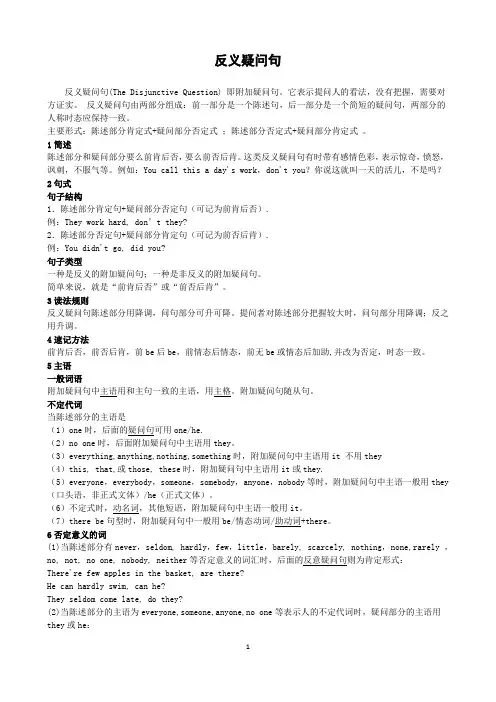
反义疑问句反义疑问句(The Disjunctive Question) 即附加疑问句。
它表示提问人的看法,没有把握,需要对方证实。
反义疑问句由两部分组成:前一部分是一个陈述句,后一部分是一个简短的疑问句,两部分的人称时态应保持一致。
主要形式:陈述部分肯定式+疑问部分否定式;陈述部分否定式+疑问部分肯定式。
1简述陈述部分和疑问部分要么前肯后否,要么前否后肯。
这类反义疑问句有时带有感情色彩,表示惊奇,愤怒,讽刺,不服气等。
例如:You call this a day's work,don't you?你说这就叫一天的活儿,不是吗?2句式句子结构1.陈述部分肯定句+疑问部分否定句(可记为前肯后否).例:They work hard, don’t they?2.陈述部分否定句+疑问部分肯定句(可记为前否后肯).例:You didn't go, did you?句子类型一种是反义的附加疑问句;一种是非反义的附加疑问句。
简单来说,就是“前肯后否”或“前否后肯”。
3读法规则反义疑问句陈述部分用降调,问句部分可升可降。
提问者对陈述部分把握较大时,问句部分用降调;反之用升调。
4速记方法前肯后否,前否后肯,前be后be,前情态后情态,前无be或情态后加助,并改为否定,时态一致。
5主语一般词语附加疑问句中主语用和主句一致的主语,用主格。
附加疑问句随从句。
不定代词当陈述部分的主语是(1)one时,后面的疑问句可用one/he.(2)no one时,后面附加疑问句中主语用they。
(3)everything,anything,nothing,something时,附加疑问句中主语用it 不用they(4)this, that,或those, these时,附加疑问句中主语用it或they.(5)everyone,everybody,someone,somebody,anyone,nobody等时,附加疑问句中主语一般用they (口头语,非正式文体)/he(正式文体)。
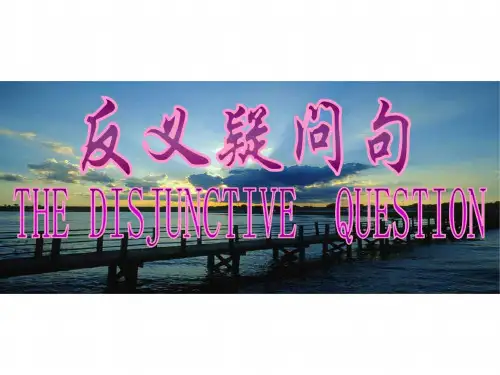
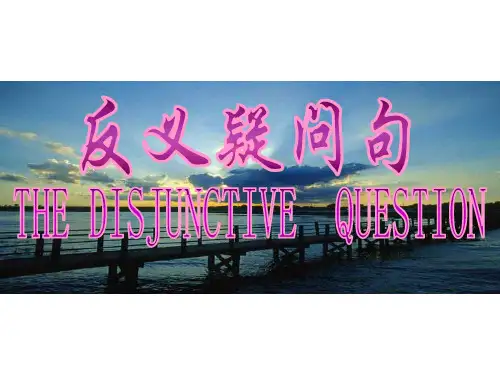
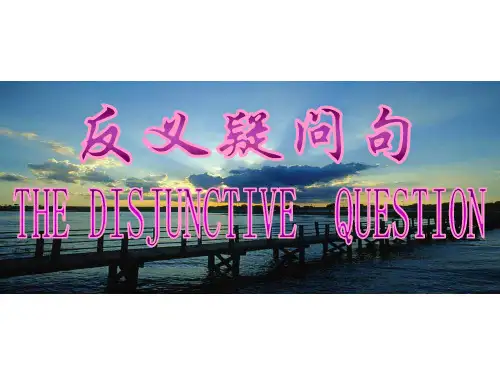
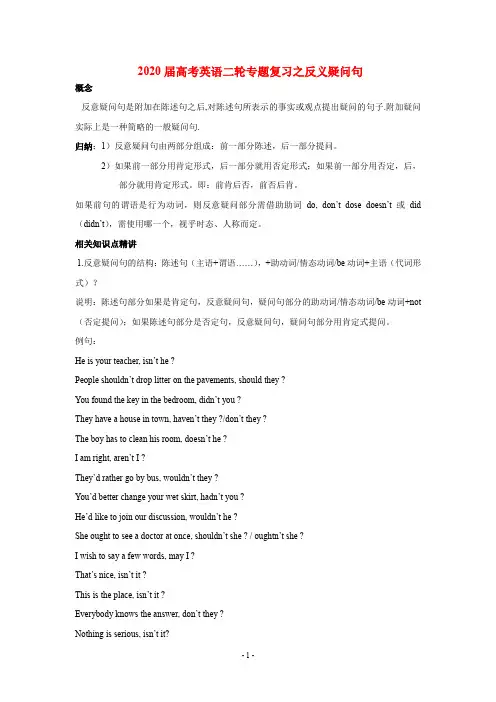
2020届高考英语二轮专题复习之反义疑问句概念反意疑问句是附加在陈述句之后,对陈述句所表示的事实或观点提出疑问的句子.附加疑问实际上是一种简略的一般疑问句.归纳:1)反意疑问句由两部分组成:前一部分陈述,后一部分提问。
2)如果前一部分用肯定形式,后一部分就用否定形式;如果前一部分用否定,后,部分就用肯定形式。
即:前肯后否,前否后肯。
如果前句的谓语是行为动词,则反意疑问部分需借助助词do, don’t dose doesn’t或did (didn’t),需使用哪一个,视乎时态、人称而定。
相关知识点精讲1.反意疑问句的结构:陈述句(主语+谓语……),+助动词/情态动词/be动词+主语(代词形式)?说明:陈述句部分如果是肯定句,反意疑问句,疑问句部分的助动词/情态动词/be动词+not (否定提问);如果陈述句部分是否定句,反意疑问句,疑问句部分用肯定式提问。
例句:He is your teacher, isn’t he ?People shouldn’t drop litter on the pavements, should they ?You found the key in the bedroom, didn’t you ?They have a house in town, haven’t they ?/don’t they ?The boy has to clean his room, doesn’t he ?I am right, aren’t I ?They’d rather go by bus, wouldn’t they ?You’d better change your wet skirt, hadn’t you ?He’d like to join our discussion, wouldn’t he ?She ought to see a doctor at once, shouldn’t she ? / oughtn’t she ?I wish to say a few words, may I ?That’s nice, isn’t it ?This is the place, isn’t it ?Everybody knows the answer, don’t they ?Nothing is serious, isn’t it?There wasn’t enough time at that moment, was there ?There used to a tower here, usedn’t there? / didn’t there ?What you need is more practice, isn’t it ?2.某些特殊句型的反意疑问句:1)祈使句的反意疑问句:表示肯定意义的祈使句,即表示“请求,提示”它的反意疑问句用will you 表达:有时也可以用won’t you 表示。
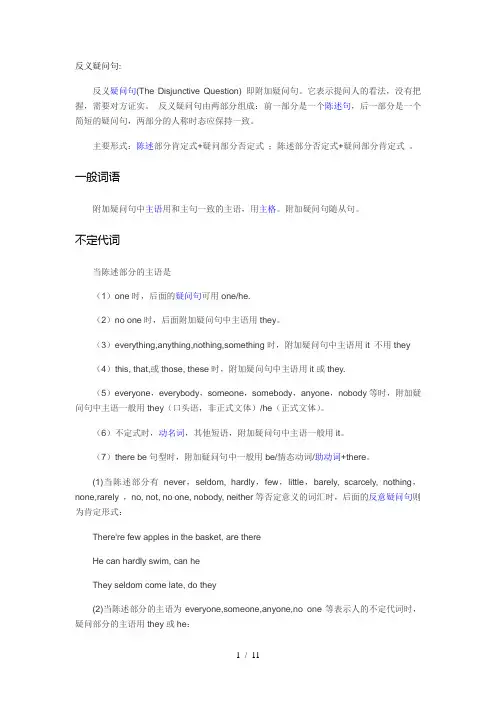
反义疑问句:反义疑问句(The Disjunctive Question) 即附加疑问句。
它表示提问人的看法,没有把握,需要对方证实。
反义疑问句由两部分组成:前一部分是一个陈述句,后一部分是一个简短的疑问句,两部分的人称时态应保持一致。
主要形式:陈述部分肯定式+疑问部分否定式;陈述部分否定式+疑问部分肯定式。
一般词语附加疑问句中主语用和主句一致的主语,用主格。
附加疑问句随从句。
不定代词当陈述部分的主语是(1)one时,后面的疑问句可用one/he.(2)no one时,后面附加疑问句中主语用they。
(3)everything,anything,nothing,something时,附加疑问句中主语用it 不用they(4)this, that,或those, these时,附加疑问句中主语用it或they.(5)everyone,everybody,someone,somebody,anyone,nobody等时,附加疑问句中主语一般用they(口头语,非正式文体)/he(正式文体)。
(6)不定式时,动名词,其他短语,附加疑问句中主语一般用it。
(7)there be句型时,附加疑问句中一般用be/情态动词/助动词+there。
(1)当陈述部分有never,seldom, hardly,few,little,barely, scarcely, nothing,none,rarely ,no, not, no one, nobody, neither等否定意义的词汇时,后面的反意疑问句则为肯定形式:There're few apples in the basket, are thereHe can hardly swim, can heThey seldom come late, do they(2)当陈述部分的主语为everyone,someone,anyone,no one等表示人的不定代词时,疑问部分的主语用they或he:Everyone in your family is a teacher, aren’t they\isn't he?(3)当陈述部分的主语为everything,something,anything.nothing等表示物的不定代词时,疑问部分的主语用it:Something is wrong with your watch, isn’t it(4)当陈述部分含有否定意思的词是unhappy,dislike,unfriendly,等含有否定词缀的派生词,也就是有un,dis,no-前缀、-less后缀等含有词缀而意思否定的词,当做肯定句处理,疑问部分要用否定形式。
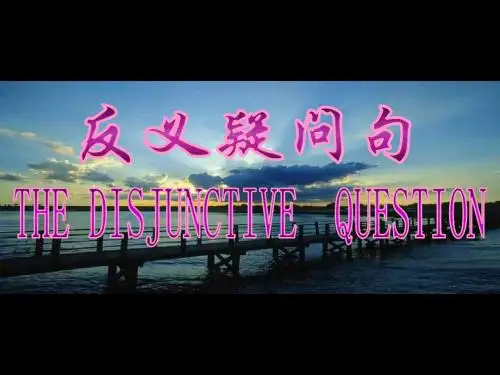
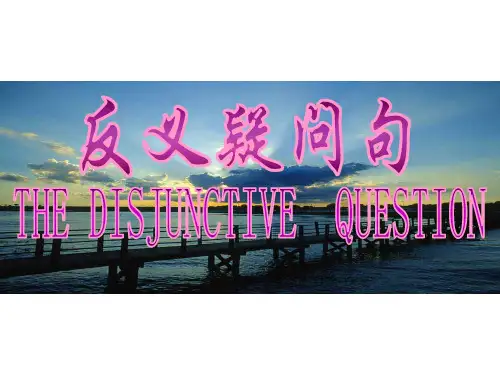
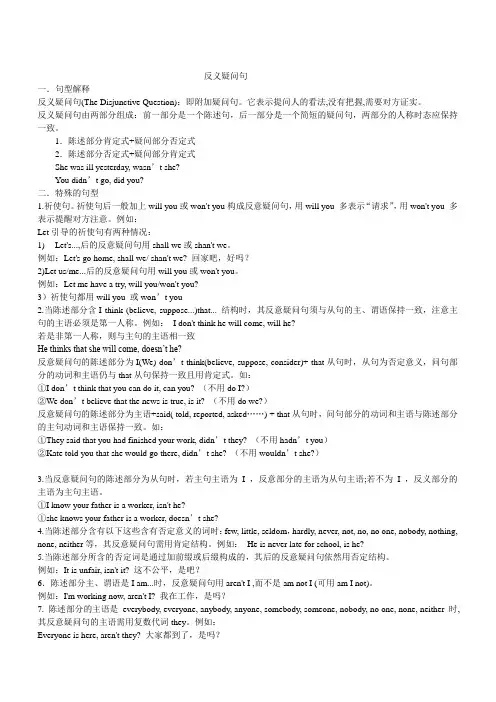
反义疑问句一.句型解释反义疑问句(The Disjunctive Question):即附加疑问句。
它表示提问人的看法,没有把握,需要对方证实。
反义疑问句由两部分组成:前一部分是一个陈述句,后一部分是一个简短的疑问句,两部分的人称时态应保持一致。
1.陈述部分肯定式+疑问部分否定式2.陈述部分否定式+疑问部分肯定式She was ill yesterday, wasn’t she?You didn’t go, did you?二.特殊的句型1.祈使句。
祈使句后一般加上will you或won't you构成反意疑问句,用will you 多表示“请求”,用won't you 多表示提醒对方注意。
例如:Let引导的祈使句有两种情况:1) Let's...,后的反意疑问句用shall we或shan't we。
例如:Let's go home, shall we/ shan't we? 回家吧,好吗?2)Let us/me...后的反意疑问句用will you或won't you。
例如:Let me have a try, will you/won't you?3)祈使句都用will you 或won’t you2.当陈述部分含I think (believe, suppose...)that... 结构时,其反意疑问句须与从句的主、谓语保持一致,注意主句的主语必须是第一人称。
例如:I don't think he will come, will he?若是非第一人称,则与主句的主语相一致He thinks that she will come, doesn’t he?反意疑问句的陈述部分为I(We) don’t think(believe, suppose, consider)+ that从句时,从句为否定意义,问句部分的动词和主语仍与that从句保持一致且用肯定式。
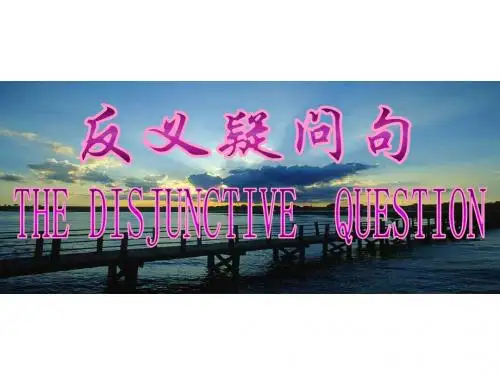
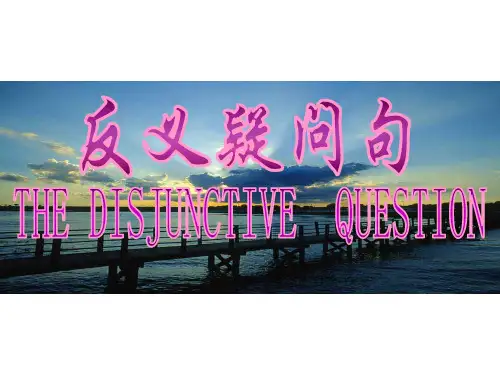
反意疑问句一、概念反义疑问句(The Disjunctive Question)即附加疑问句,反意疑问句是疑问句的一种,是对陈述句所说的事实或观点提出疑问,起证实作用,一般用于证实说话者所说的事实或观点。
反意疑问句是由陈述句和附在其后的附加疑问句组成。
结构有以下两种:1.陈述部分肯定式+疑问部分否定式2.陈述部分否定式+疑问部分肯定式即:前肯后否,前否后肯。
反义疑问部分用助动词或情态动词或be动词+名词或代词(主格)。
如:丁八©丫 work hare, don't they?She was ill yesterday, wasn't she?You didn't go, did you?He can't ride a bike, can he?二、反义疑问句的用法1.陈述部分主语是I的肯定形式时,疑问部分要用aren't I. 如:1‘山 astall as your sister,aren't I?2.陈述部分含有否定词或半否定词,以及含有由否定意义的词的反意疑问句当陈述部分有 never,seldom, hardly, few, little,barely, scarcely, nothing, nobody等否定词或半否定词时,反意疑问部分用肯定形式。
否定前缀不能视为否定词,其反意疑问句仍用否定形式。
如:There are few apples in the basket, are there?He can hardly swim, can he?They seldom come late, do they?It is impossible, isn't it?He is not unkind to his classmates, is he?3、含有宾语从句的反意疑问句当陈述部分是一个(带that引导宾语从句的)主从复合句时,附加疑问句的主谓要和主句的主谓保持对应关系。
一、反意疑问句的意义及其构成反意疑问句又叫附加疑问句,是指当提问的人对前面所表达的事实不敢肯定,而需要向对方加以证实时所提出的问句。
其结构为:前一局部是一个陈述句,后一局部是一个简单的问句。
完成后一局部简单问句时,要根据前面陈述句的动词时态和人称来选择适当的助动词进行提问,前后两局部的人称和动词时态要保持一致。
如果前一局部用肯定式,后一局部一般用否认式;反之,前一局部为否认式,后一局部要用肯定式,即“前肯定后否认,前否认后肯定〞。
例You have been to Beijing, haven’t y ou? 你去过北京,是吗?二、简单句式结构中反意疑问句的运用反意疑问句运用于简单句式结构中时,我们应注意掌握以下几个方面1、当陈述句局部的主语是名词时,反意疑问句的主语必须用人称代词来代替。
例Your brother has gone to the library, hasn’t he? 你弟弟去图书馆了,是吗?2、当陈述句的主语是指示代词this, that时,反意疑问句的主语用it代替;指示代词是these, those 时,反意疑问句的主语用they代替。
例 Tha t isn’t a useful book, is it? 那不是一本有用的书,是吗?These are important reading materials, aren’t they? 这些都是重要的阅读材料,是吗?3、当陈述句局部是I am…时,反意疑问句局部通常要用aren’t I;如陈述句局部的主语是I am not时,反意疑问句局部通常要用am I。
例I’m late for the meeting, aren’t I? 我开会迟到了,是吗?I’m not doing well, am I? 我干得不好,是吗?4、当陈述局部是everyone / everybody, someone / somebody, no one / nobody, none等表示人的不定代词时,反意疑问句局部的主语多用they,但也可用he;当陈述局部的主语是everything, anything, something, nothing等表示物的不定代词时,反意疑问句局部的主语用it。
反义疑问句讲解及答案反义疑问句是一种附加疑问句,用于表示提问人的不确定或需要对方证实的看法。
这种句型由两部分组成,即陈述句和简短的疑问句,两部分的人称时态应保持一致。
陈述部分为肯定式时,疑问部分为否定式,反之亦然。
例如,昨天她病了,是吗?你没去,是吧?在特殊情况下,祈使句也可以构成反义疑问句。
通常情况下,祈使句后会加上will you或won't you,用于表示请求或提醒对方注意。
当祈使句以Let开头时,反义疑问句有两种情况:以shall we或shan't we结尾,或以will you或won't you结尾。
例如,回家吧,好吗?让我试一试,行吗?当陈述部分含有I think (believe。
suppose。
)that。
结构时,反义疑问句的主语必须是第一人称,并且须与从句的主、谓语保持一致。
如果是非第一人称,则反义疑问句的主语应与主句的主语相一致。
当陈述部分为I(We) don’t think(believe。
suppose。
consider)+that从句时,问句部分的动词和主语仍与that从句保持一致且用肯定式。
例如,我认为他不会来,对吗?他认为她会来,不是吗?我们不相信这个消息是真的,是吗?When using a statement in the form of subject + said (told。
reported。
asked。
) + that clause for a tag n。
the verb and subjectof the n part should agree with those of the main clause。
For example:①They said that you had finished your work。
didn't they。
(Not "hadn't you?")②Kate told you that she would go there。
2020届高考英语二轮专题复习之反义疑问句概念反意疑问句是附加在陈述句之后,对陈述句所表示的事实或观点提出疑问的句子.附加疑问实际上是一种简略的一般疑问句.归纳:1)反意疑问句由两部分组成:前一部分陈述,后一部分提问。
2)如果前一部分用肯定形式,后一部分就用否定形式;如果前一部分用否定,后,部分就用肯定形式。
即:前肯后否,前否后肯。
如果前句的谓语是行为动词,则反意疑问部分需借助助词do, don’t dose doesn’t或did (didn’t),需使用哪一个,视乎时态、人称而定。
相关知识点精讲1.反意疑问句的结构:陈述句(主语+谓语……),+助动词/情态动词/be动词+主语(代词形式)?说明:陈述句部分如果是肯定句,反意疑问句,疑问句部分的助动词/情态动词/be动词+not (否定提问);如果陈述句部分是否定句,反意疑问句,疑问句部分用肯定式提问。
例句:He is your teacher, isn’t he ?People shouldn’t drop litter on the pavements, should they ?You found the key in the bedroom, didn’t you ?They have a house in town, haven’t they ?/don’t they ?The boy has to clean his room, doesn’t he ?I am right, aren’t I ?They’d rather go by bus, wouldn’t they ?You’d better change your wet skirt, hadn’t you ?He’d like to join our discussion, wouldn’t he ?She ought to see a doctor at once, shouldn’t she ? / oughtn’t she ?I wish to say a few words, may I ?That’s nice, isn’t it ?This is the place, isn’t it ?Everybody knows the answer, don’t they ?Nothing is serious, isn’t it?There wasn’t enough time at that moment, was there ?There used to a tower here, usedn’t there? / didn’t there ?What you need is more practice, isn’t it ?2.某些特殊句型的反意疑问句:1)祈使句的反意疑问句:表示肯定意义的祈使句,即表示“请求,提示”它的反意疑问句用will you 表达:有时也可以用won’t you 表示。
2020届高考英语二轮专题复习之反义疑问句概念反意疑问句是附加在陈述句之后,对陈述句所表示的事实或观点提出疑问的句子.附加疑问实际上是一种简略的大凡疑问句.归纳:1)反意疑问句由两部分组成:前一部分陈述,后一部分提问。
2)如果前一部分用肯定形式,后一部分就用否定形式;如果前一部分用否定,后,部分就用肯定形式。
即:前肯后否,前否后肯。
如果前句的谓语是行为动词,则反意疑问部分需借助助词do,don’tdose doesn’t或did(didn’t),需使用哪一个,视乎时态、人称而定。
相关知识点精讲1.反意疑问句的结构:陈述句(主语+谓语……),+助动词/情态动词/be动词+主语(代词形式)?说明:陈述句部分如果是肯定句,反意疑问句,疑问句部分的助动词/情态动词/be动词+not(否定提问);如果陈述句部分是否定句,反意疑问句,疑问句部分用肯定式提问。
例句:He is your teacher, isn’t he ?People shouldn’t drop litter on the pavements, should they ?You found the keyin the bedroom, didn’t you ?They have a house in town, haven’t they ?/don’t they ?The boy has to clean his room, doesn’t he ?I am right, aren’t I ?They’d rather go by bus, wouldn’t they ?You’d better change your wet skirt, hadn’t you ?He’d like to join our discussion, wouldn’t he ?She ought to see a doctor at once, shouldn’t she ? / oughtn’t she ?I wish to say a few words, may I ?That’s nice, isn’t it ?This is the place, isn’t it ?Everybody knows the answer, don’t they ?Nothing is serious, isn’t it?There wasn’t enough time at that moment, was there ?There used to a tower here, usedn’t there? / didn’t there ?What you need is more practice, isn’t it ?2.某些分外句型的反意疑问句:1)祈使句的反意疑问句:表示肯定意义的祈使句,即表示“请求,提示”它的反意疑问句用willyou表达:有时也可以用won’t you表示。
Go home now, will you ?Close the window, please, will you ?否定祈使句:以Don’t开始的祈使句:表示“不要……”,用will you提问:Don’t be late again, will you ?Don’t forget to pay your income tax, will you ?Let’s引导的祈使句表示“建议”,反意疑问句部分是:shall we ?Let’s go for a walk, shall we ?Let’s have a rest now, shall we ?Letme或Letus引导的祈使句表示“请求”,反意疑问句部分为willyou:Let me have a try, will you ?Let us help, will you ?2)感叹句的反意疑问句:一律用否定式提问。
What a clever boy, isn’t he ?What a lovely day, isn’t it?3)陈述句含有情态动词must有两种情况:must表示“必须”,反意疑问句部分为mustn’t…? / needn’t…?He must study hard at English, mustn’t he? / needn’t he?You must go home now, needn’t you? / mustn’t you?We mustn’t be late, must we ?Must表示推测:“一定,肯定”反意疑问句部分与must后面的动词呼应You must be joking, aren’t you?He must be ill, isn’t he ?注意:用must对过去的动作推测时,反意疑问句部分的助动词用did或have,而对过去的状态推测,反意疑问句部分的be动词用was:She must have finished her work, hasn’t she ? / didn’t she ?Jack must have arrived here yesterday, didn’t he ?He must have been a policem an, wasn’t he ?4)陈述句中有否定副词:hardly;never;seldom;little;few;nowhere;nothing等词,反意疑问句部分用肯定提问:Frank hardly goes to parties, does he ?He has few friends, has he ?5)复合句的反意疑问句:大多数复合句的反意疑问句都对主句提问:He was punished because he violated the regulation, wasn’t he?You never told me that you had been ill, did you ?注意:I don’t think/suppose/believe/imagine引导的宾语从句,这种宾语从句的反意疑问句应与从句的主语,谓语部分一致,而且用肯定式的提问。
I don’t suppose anyone will volunteer, will they ?I don’t believe she has done it, has she ?I think he will come. won’t he?一些分外的反意疑问句:1.陈述部分的主语是I“m...句型时,疑问部分要用aren“t I。
如:I“m an English teacher, aren“t I?我是一名英语老师,不是吗?2.陈述部分是感叹句时,疑问部分用be +主语。
如:What beautiful hats, aren“t they?多么幽美的帽子,不是吗?3.陈述部分是省去主语的祈使句时,疑问部分用will you。
如:Don“t be late next time, will you?下次不要迟到了,好吗?Come here, will you / won“t you?到这儿来,好吗?注意:Let“s开头的祈使句,疑问部分用shall we,Let us开头的祈使句,疑问部分用will you。
如:Let“sstartwiththesong,shallwe?咱们以这首歌开始,好吗?Let us help you, will you?让我帮助你,好吗?4.陈述部分的谓语是wish,疑问部分要用may +主语。
如:I wish to go to Beijing, may I?我希望去北京,好吗?5.陈述部分用no, nothing, nobody, never, few, seldom, hardly, rarely,little等否定含义的词时,疑问部分用肯定含义。
如:They never go there, do they ?他们从不去那儿,是吗?6.含有oughtto 的反意疑问句,陈述部分是肯定的,疑问部分用shouldn“t / oughtn“t +主语。
如:He ought to know what to do, oughtn“t he? / shouldn“t he?他应该知道该做什么,对吗?7.陈述部分有have to +v.(had to + v.),疑问部分常用don“t +主语(didn“t +主语)。
如:We have to sleep here, don“t we?我们必须睡在这儿,对吧?8.must在表“推测”时,根据其推测的情况来确定反意疑问句。
如:He must be Tom, isn“t he?他一定是汤姆,不是吗?It must be going to rain tomorrow, won“t it?明天肯定要下雨,是吗?9.陈述部分的谓语是used to时,疑问部分用didn“t +主语或usen“t +主语。
如:He used to be a bad boy, didn“t he? / usen“t he?他过去是个坏男孩,是吧?10.陈述部分有had better + v.,疑问句部分用hadn“t you。
如:You“d better go there now, hadn“t you?你最佳现在去那儿,好吗?11.陈述部分有would rather +v.,疑问部分多用wouldn“t +主语。
如:He would rather read it ten times than recite it, wouldn“t he?他宁可读十遍也不愿意背诵,是吗?12.陈述部分有You“d like to +v.,疑问部分用wouldn“t +主语。
如:You“d like to go to bed earlier, wouldn“t you?你想早点儿睡觉,对吗?13.陈述部分有must,疑问部分根据实际情况而定。
如:He must be a doctor, isn“t he?他肯定是医生,是吗?You must have studied Eng lish for four years, haven“t you? / didn“tyou?你一定学了四年英语,对吗?Hemusthavefinishedityesterday,didn“the?他肯定是在昨天完成任务的,是吗?14.陈述部分由neither... nor, either... or连接的并列主语时,疑问部分根据其实际逻辑意义而定。
如:Neither you nor I am a teacher, are we?你不是老师,我也不是,对吗?15.陈述部分主语是指示代词或不定代词everything, that, nothing, this,疑问部分主语用it。